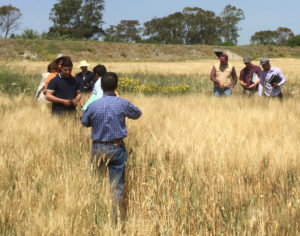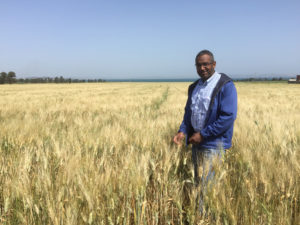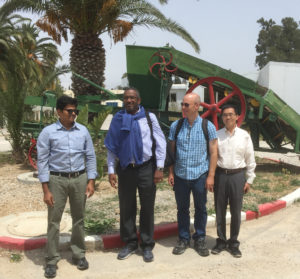Texas A&M AgriLife partners with Tunisia to improve soil management
U.S. Department of State project designed to improve economic viability, security
Writer: Kay Ledbetter, 806-677-5608, [email protected]
Contacts: Dr. Amir Ibrahim, 979-845-8274, [email protected]
Dr. Jake Mowrer, [email protected]
Dr. Qingwu Xue, 806-354-5803, [email protected]
Dr. Anil Somenahally, 903-834-6191, [email protected]
COLLEGE STATION – Improving the livelihood of small-acreage landholders is the goal of recent trips to Tunisia by Texas A&M AgriLife faculty members focusing on soil management and sustainability in cereal crops to improve the country’s overall economics.

Fostered by the U.S. Embassy in Tunis and the U.S. Department of State, a pilot partnership was established between Texas A&M AgriLife Research and Texas A&M AgriLife Extension Service and l’Institution de la Recherche et de l’Enseignement Supèrieur Agricoles, or IRESA, in Tunisia.
Faculty members from Texas A&M University soil and crop sciences department are Dr. Amir Ibrahim, AgriLife Research wheat breeder, College Station; Dr. Jake Mowrer, AgriLife Extension state soil fertility specialist, College Station; Dr. Qingwu Xue, AgriLife Research crop physiologist, Amarillo; and Dr. Anil Somenahally, AgriLife Research soil scientist, Overton. They are joined by six researchers from IRESA.
The team traveled to Tunisia on a pilot partnership established to “create a more secure, democratic and prosperous world for the benefit of the American people and the international community,” said Dr. David Baltensperger, head of the Texas A&M University department of soil and crop science in College Station.
“By helping the country become more efficient in its agricultural abilities, our scientists learn about opportunities for Texas producers also,” Baltensperger said.

The purpose of the partnership was to initiate and facilitate the exchange of research, teaching and extension resources in the area of sustainable soil management, Ibrahim said.
Tunisian scientists have indicated a need for the development of a significant research program to reduce soil degradation and improve soil health and the soil’s ability to support vital ecosystem activities and how best to manage soils to tackle the challenge of climate change.
At their initial visit, the Texas A&M faculty helped conduct four workshops to: enhance knowledge of each institution’s capacity and resources; build strong cooperation for innovation; enhance technology and knowledge transfer between institutions; and design collaborative funded research for development projects.
“The first time we went, we were there to conduct the actual workshops,” Xue said. “These workshops were attended by Tunisian scientists, students and agricultural administrators. During these workshops we spent much time presenting and exchanging ideas on sustainable soil management and key areas where we should focus.”
Tunisia has a typical Mediterranean climate, with wet and cool winters and hot and dry summers. Their primary crops grown are cereal grains and olives.
“Currently their agricultural practices are facing challenges due to soil health degradation, aridity, water and soil salinity, and climate change,” Somenahally said. “Therefore, improving and conserving soil quality is a key mission for their farmers for sustainable production.”

That’s where the AgriLife team began working, offering information on key research priorities including soil management optimization, practices leading to soil organic matter improvement, soil biodiversity and functions related to land management practices, nutrient fluxes and integrated plant and soil system approaches, new sensor technology, and improved and adapted crops.
Some of the crops they focused on were durum and bread wheat varieties resilient to climate change, forage sorghum hybrids adapted to acidic and other marginal soils, and other cereal and legume forages, Ibrahim said.
Development of early maturing and high-yielding wheat varieties with adequate post-flowering drought and heat tolerance to the different adaptation zones of Tunisia is of paramount importance, he said.
Following the AgriLife team visit, the core Tunisian team of scientists and administrators came to Texas in June 2016 and toured College Station and the surrounding research centers. They also met with university faculty and the Texas A&M’s Center for Teaching Excellence to review and help develop curriculum in soil sciences for the Tunisian universities and institutions.
The AgriLife team made a second trip to Tunisia in April to attend an international conference and develop more specific research and extension plans. During the April trip, the team had an opportunity to tour a working farm near the Mediterranean Sea that had implemented soil conservation tillage practices.
“We learned about their cereal cropping and rotation systems under the Mediterranean climate, which is similar to the Texas High Plains environment,” Xue said. “There are many things we can share with them from what we have learned here in Texas.
“For instance, conservation tillage has been practiced for decades in the Texas Panhandle. We are pleased this technology can be used in another part of the world. The majority of their land is farmed dryland and we know conservation tillage helps preserve moisture, prevent wind erosion and promote soil health and organic carbon.”
The first phase of the project ends in 2017, but the AgriLife team is making plans for future work.
“Our long-term goal is to improve the small-acreage landholder livelihood in cereal-production areas in Tunisia by optimizing the use of resources through appropriate soil management that will enhance soil quality and water productivity and ensure soil sustainability,” Mowrer said.
“This could be achieved by creating a Center of Excellence that will support the development and the implementation of technologies and capacity building to improve soil quality management, sustainable agriculture and climate change in the Middle East and North Africa region.”
As a result of this project, Mowrer was invited to join the roster of Fulbright specialists and to conduct a workshop on soil nutrient management and soil testing. Over the course of one week, he assessed the capacity for a Tunisian national soil testing program, met with leaders of stakeholder organizations, visited laboratories and field research facilities, and presented a vision of what such a program might look like in the very near future.
“The outcome was much more positive than I could have expected going in,” Mowrer said, “with 100 percent commitment to an initial pilot program involving six major national organizations aligned with higher education, research, policy-making and extension activities.”
Opportunities for effective knowledge exchange and dialogue at many different levels, coupled with AgriLife Extension through demonstration activities with farmers’ participation in farmer-managed trials, will continue in the future, Somenahally said.


